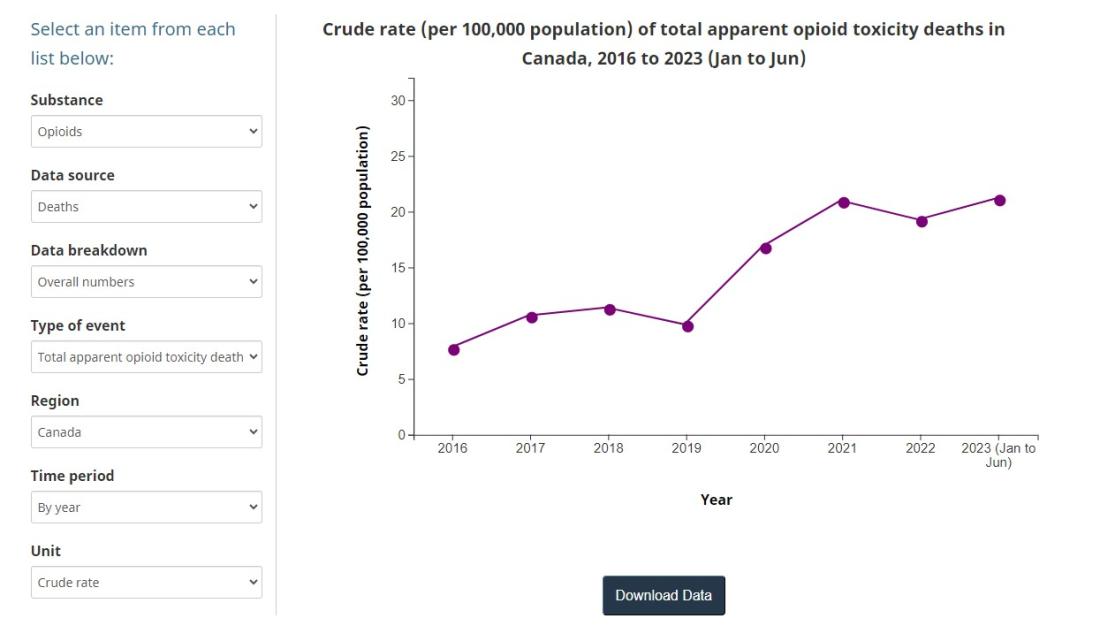
Joe Rogan guest's false claims on Canadian life expectancy spread online
- This article is more than two years old.
- Published on January 19, 2024 at 23:13
- 5 min read
- By Gwen Roley, AFP Canada
"Canada's overall life expectancy -- that might be the craziest statistic in the world right now," says comedian Tony Hinchcliffe on a January 2, 2024 episode of The Joe Rogan Experience, which AFP has previously fact-checked for spreading misinformation.
Rogan and Hinchcliffe go on to claim that "booster and booster" caused Canadian life expectancy to decrease beginning in 2020.
Footage of the conversation spread across the internet -- particularly video platforms such as TikTok, Instagram and YouTube -- where it received tens of thousands of views, while users attached images, captions and comments which implied a connection between a decrease in Canadian life expectancy and Covid-19 vaccines.


The posts are the latest examples of false and misleading claims about purported harmful effects of Covid-19 vaccines, which according to researchers have saved millions of lives and averted many hospitalizations.
In November 2023, the Canadian government's data collection agency, Statistics Canada, released a report which announced the life expectancy at birth in the country had decreased for the third year in a row in 2022, falling from 81.6 to 81.3 years (archived here). Additional data from Statistics Canada shows the life expectancy had been increasing for much of the 20th century (archived here), a trend Hinchcliffe attributes to "technology and medicine" on the podcast.
The November report affirms that the downward trend began in 2020 -- with a change of one year in life expectancy over three years.
However, Statistics Canada told AFP in a January 16 email that since there had only been 12 deaths related to Covid-19 vaccines recorded in the Canadian Vital Statistics database (archived here), the decrease in estimated life expectancy was driven more by cases of people dying from Covid-19 itself, as well as a higher rate of mortality among young and middle-aged Canadians.
"Life expectancy declines when there are more deaths, when deaths occur at younger ages, or a combination of both," the agency said.
According to data from Health Canada (archived here), 455 deaths were reported after Covid-19 vaccination as of September 15, 2023, but only four were found to have a causal association with the shots.

Overdoses and deaths among young people
Statistics Canada said many deaths among young Canadians are currently attributed to "ill-defined causes." These records are updated as investigations into the deaths are concluded and the agency said they are often found to be related to unintentional injuries, substance-related toxicity, suicide and homicide.
Even before the pandemic, mental health researchers were studying how an increase in deaths among young people, driven largely from substance-related causes, could lead to an overall decrease in life expectancy (archived here).
Tom Elliott, an associate clinical professor at the University of British Columbia who studies life expectancy (archived here), also said that the diminishing Canadian life expectancy could be attributed to substance-related deaths -- pointing particularly to opioid overdose.
"The biggest driver of the reduction in life expectancy has been the Fentanyl crisis, or let's call it opioid crisis and deaths from overdose," he said in an interview on January 16.
Elliott said that since many of these deaths were happening among young people, the overall life expectancy would be statistically pulled down as more Canadians died earlier in life.
According to Statistics Canada, 7.8 out of 100,000 deaths in the country in 2016 were caused by apparent opioid toxicity and by 2022 that rate had risen to 19.3 (archived here). Each year since 2016, around 70 percent of these opioid-related deaths have been among people aged 49 years and younger (archived here).


Covid-19 and chronic conditions
Doug Manuel, a senior scientist at the Ottawa Hospital, said another force pushing down life expectancy was deaths from Covid-19, pointing out in a January 18 interview that more people in Canada had died from the disease in 2022 than each of the previous two years of the pandemic.
According to Statistics Canada, Covid-19 was the third leading cause of death in 2022, killing nearly 20,000 people which accounted for 5.9 percent of all deaths (archived here).
"The risk of death from Covid-19 has been going down, but now that so many people have gotten infected, the total number of deaths have been quite large," Manuel said.
On top of Covid-19 mortality, Manuel said that increasing deaths from chronic conditions were also contributing factors to a shorter life expectancy in Canada.
"We've had a lot of progress in heart disease and cancer, but we're now facing headwinds with diabetes and hypertension going up," he said.
Vaccines not related
Both Manuel and Elliott said that while there can be adverse effects from vaccines, they did not observe deaths from the jabs contributing to the decreased life expectancy.
"Vaccines can cause adverse events but this is Covid-19 deaths, not Covid-19 vaccines," Manuel said.
Physicians have consistently told AFP that while there can sometimes be side effects following Covid-19 vaccination, which can range from mild to more long-lasting, the benefits of receiving the shots far outweighs the risk of severe illness and death.
Canada continues to monitor reactions related to vaccination (archived here). Statistics Canada told AFP that it is also maintaining its record of deaths concluded to have been caused by Covid-19 vaccination.
Read more of AFP's reporting on misinformation in Canada here.
Copyright © AFP 2017-2026. Any commercial use of this content requires a subscription. Click here to find out more.
Is there content that you would like AFP to fact-check? Get in touch.
Contact us




